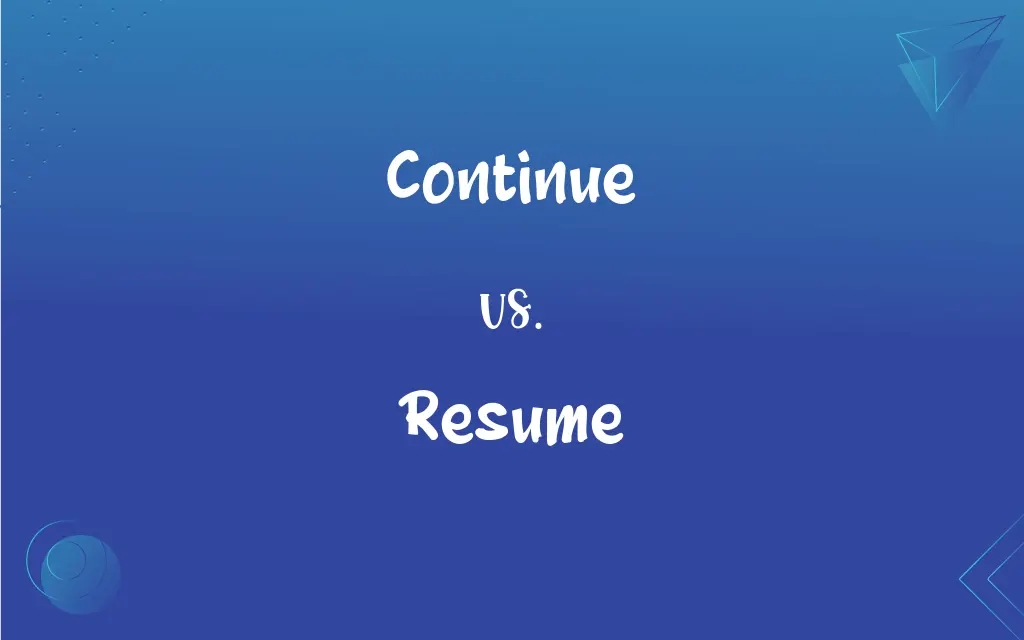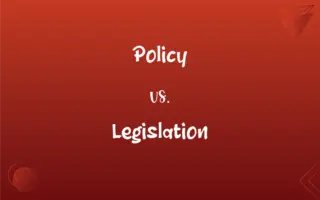Continue vs. Resume: What's the Difference?
Edited by Aimie Carlson || By Janet White || Published on January 16, 2024
"Continue" means to persist in an activity without interruption, while "resume" implies restarting something after a pause.

Key Differences
"Continue" refers to carrying on with an activity or process that is already in progress, often without any break. In contrast, "resume" is used when an activity that was previously paused or halted is started again. Both words imply a progression, but the contexts of their usage are distinct.
In the context of actions, "continue" implies a seamless, ongoing process, suggesting that there is no break or interruption. On the other hand, "resume" specifically indicates a return to an activity after an interruption, highlighting a break in continuity.
When considering time frames, "continue" often lacks a specified duration; it simply means to keep going. In contrast, "resume" is usually followed by a reference to a pause, indicating that the activity had stopped for a certain period.
In a narrative or descriptive context, "continue" helps in maintaining the flow of events or descriptions. Conversely, "resume" is used to signal the reader or listener that the narrative or action is picking up after a pause.
From a syntactic viewpoint, "continue" can be used in various forms without altering its fundamental meaning. "Resume," however, often requires additional context or information about the pause to convey the complete sense.
ADVERTISEMENT
Comparison Chart
Connotation
Ongoing action without break
Restarting after a break
Time Reference
Implies indefinite continuation
Implies a specific pause period
Narrative Use
Maintains flow of events
Signals a return to action
Grammatical Forms
Used in various forms
Often requires contextual info
Emotional Implication
Suggests steadiness
Suggests renewal or return
ADVERTISEMENT
Continue and Resume Definitions
Continue
Keep a condition or process in effect.
The company will continue its policy of hiring locally.
Resume
Return to a previous condition.
Normal services will resume tomorrow.
Continue
Persist in an activity.
She decided to continue her studies despite the challenges.
Resume
Continue after interruption.
The negotiations will resume in the morning.
Continue
Proceed with an action.
He continued walking despite the rain.
Resume
Begin again after a pause.
After the intermission, the play will resume.
Continue
Maintain the course of action.
They continued their journey after a short break.
Resume
Restart a process or activity.
She will resume her piano lessons next week.
Continue
Extend beyond a certain point.
The road continues beyond the horizon.
Resume
Reoccupy a position.
He resumed his seat after the speech.
Continue
To go on with a particular action or in a particular condition; persist
We continued until the job was finished.
Resume
A brief account of one's professional or work experience and qualifications, often submitted with an employment application.
Continue
To exist over a period; last
The meeting continued for another hour.
Resume
A summary
A résumé of the facts of the case.
FAQs
Can "continue" and "resume" be used interchangeably?
Not usually, as they have different implications regarding the continuity of the action.
Can "continue" be used to indicate a start of something new?
No, "continue" implies ongoing action, not starting anew.
Is "resume" appropriate for actions that never stopped?
No, "resume" is for actions that were paused or halted.
Does "continue" always imply no interruption?
Yes, it implies ongoing action without interruption.
Can "resume" imply a long break?
Yes, it can be used for both short and long breaks.
Can "resume" be used without specifying what is being resumed?
It usually requires context or a direct object to be clear.
Can "resume" be used in informal settings?
Yes, it's suitable for both formal and informal contexts.
Can "continue" be used in a command?
Yes, it's often used as an imperative.
Can "resume" indicate a permanent restart?
It implies a restart, but not necessarily a permanent one.
Is "continue" used in legal or formal documents?
Yes, it's commonly used in formal and legal contexts.
Is "continue" suitable for a resumed action after a break?
Not typically; "resume" is more appropriate in this context.
Does "continue" imply a future action?
It can refer to both present and future ongoing actions.
Can "resume" refer to resuming a position or role?
Yes, it can refer to returning to a role, position, or activity.
Does "continue" need additional context?
It can stand alone but may be clarified with additional details.
Does "continue" always require an object?
Not always; it can be used transitively or intransitively.
Is "continue" suitable for physical actions only?
No, it can refer to both physical actions and abstract processes.
Can "resume" be followed by an infinitive?
Yes, it can be followed by an infinitive to indicate the action being resumed.
Is "resume" used for past actions?
It's typically used for present or future actions.
Is "resume" appropriate in instructional contexts?
Yes, especially when instructing to restart an activity.
Is "continue" applicable in academic contexts?
Yes, it's widely used in academic writing and discussions.
About Author
Written by
Janet WhiteJanet White has been an esteemed writer and blogger for Difference Wiki. Holding a Master's degree in Science and Medical Journalism from the prestigious Boston University, she has consistently demonstrated her expertise and passion for her field. When she's not immersed in her work, Janet relishes her time exercising, delving into a good book, and cherishing moments with friends and family.
Edited by
Aimie CarlsonAimie Carlson, holding a master's degree in English literature, is a fervent English language enthusiast. She lends her writing talents to Difference Wiki, a prominent website that specializes in comparisons, offering readers insightful analyses that both captivate and inform.






































































